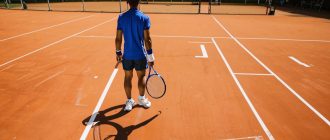Jelena Dokic officially announced the end of her career five years ago, leaving the sport early due to injury. For many years spent on the tennis court, the girl managed to reach considerable heights: the status of the fourth racket of the world in the singles ranking and tenth in doubles. On all official pages with her data in the column “weight” you can see the figure 60, which at a height of 175 cm is an excellent indicator. But, unfortunately, after stopping training, Elena not only failed to keep her sports shape, but also gained up to 120 kg. Perhaps, someone will think: “It’s her own fault for neglecting herself”. But in the life of the Australian tennis player everything is not so easy and unambiguous. We tell you why psychological problems play a major role in this story, and how Dokic was able to pull herself together to start the fight for recovery.
Violence from her own father
It is not in vain to say that many psychological problems of adults originate in childhood. Jelena’s relationship with her father and tennis coach Damir Dokic became a subject for discussion after the release of the athlete’s autobiography entitled “Unbroken”. In response to her sporting successes, witnessed by the entire tennis world, instead of the joy of her parents, Jelena received only an astonishing amount of violence and cruelty.
After the Dokic family moved from Yugoslavia to Australia, her father began to drink alcohol to cope with the stress. According to Jelena, his anger at the hardships of living as a refugee in a country with a foreign culture and unfamiliar language grew stronger every day. Damir realized that his daughter, a promising tennis player from the beginning of her career, was the only one who could save the family from financial problems and start a better life.
Nevertheless, the man was never satisfied with his daughter’s progress. He expressed his emotions through physical violence. Her father would beat Elena with a leather belt across her naked body and a pointy-toed boot across her face, intensifying the blows for every emotion that came out. In addition, the child may have been left without a place to sleep. The latter happened after 17-year-old Dokic reached the semifinals of Wimbledon and lost there to Lindsay Davenport. It was a huge breakthrough for the young tennis player, but also a reason for anger on the part of her father. Moreover, neither her mother nor her younger brother could change the head of the family and save the athlete from the tyrant.
Damir Dokic, in turn, does not seek to hide his “unconventional methods of upbringing” from the public. In an interview with the Serbian newspaper “Vecernje Novosti” he admitted that he himself had been the object of violence from his parents more than once and considers beatings to be an absolutely normal practice, which helped him to become a “decent man”.
Deep depression
However, Elena is hardly ready to thank Damir for such an attitude to himself. The result of a perverted upbringing was, among other things, an increased tendency to depression.
I had severe depression, and because of it I almost lost my life. I was ready to commit suicide – I was lucky to survive. I was going to jump and I don’t know why I didn’t. The decision was made in a split second,” said the former tennis player.
Similar psychological complications caught up with Dokic after her “retirement”. The athlete was not ready to face the usual life without training, where the responsibility for all decisions fell not on the mentors and managers, but only on her shoulders.
A major component of Elena’s routine days became food. She simply ate massive amounts of fast food to nourish her worries.
I ate junk food every day. It got to the point where I was eating the exact opposite of how an athlete should. French fries and hamburgers became my regular food and I devoured them daily. I became a sweet tooth and ate everything in my path if it had sugar in it,” Dokic told the Daily Mail.
Getting back in shape
This lifestyle coupled with glandular fever, thyroid disease and the exclusion of 7-hour gym sessions quickly took a toll on her weight, her reflection in the mirror and her health. Jelena reached a critical 120 kg, twice her playing weight of 60-66 kg.
At a certain point, Dokic realized that her parameters were no longer healthy. She realized that the help of specialists in such a neglected case she just needed. That’s why Jelena became an ambassador of the Jenny Craig weight loss program, where professional nutritionists prepare her menu and regulate the size of portions.

Elena Dokich’s weight loss progress
Every week Elena meets with specially trained counselors who support her every step of the way and do not let her lose weight. The girl only has to stick to the recommendations and remember that her weight loss is now followed by many people.
In addition, Dokich returned to regular gym sessions and found the strength to motivate herself. Elena adheres to a diverse training strategy, which includes both strength and cardio training. And to find the strength for physical exertion, the athlete advises to find her own motivation, because there is no universal recipe. One thing she can say for sure is that you shouldn’t think and doubt for a long time – otherwise you simply won’t be able to find inspiration for training.
Thus, at the beginning of an intensive recovery of the form in October 2018 Elena managed to lose 40 kilograms already by March 2019. And, as the former tennis star guarantees, this is far from the end. And we can only wish her luck and believe that a return to physical and psychological health is possible even in the most seemingly neglected cases.






